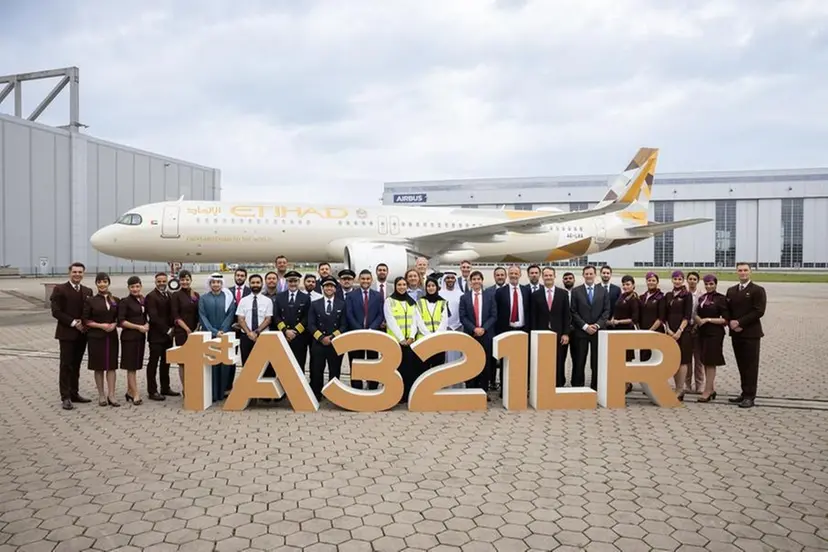
Etihad Airways takes delivery of its first Airbus A321LR aircraft
Etihad Airways has taken delivery of its first Airbus A321LR (lengthy vary) following ceremony on the Airbus Finkenwerder website, marking a transformational milestone within the airline’s fleet enlargement technique. The aircraft brings Etihad’s signature widebody expertise to quick and medium-haul routes, with premium cabins sometimes discovered solely on long-haul flights. This is the first of 30 A321LR aircraft scheduled to affix Etihad’s fleet.
Antonoaldo Neves, Chief Executive Officer of Etihad Airways, stated: “Today marks an extraordinary moment for Etihad as we welcome an aircraft that changes everything we thought possible on a single-aisle plane. The A321LR enables us to serve more destinations with the same premium experience our guests expect across all cabins, perfectly embodying our commitment to delivering luxury at every altitude.”
Redefining Narrowbody Travel
The A321LR contains a three-cabin configuration, together with Etihad’s first-ever narrowbody First Suites – non-public, enclosed areas with sliding doorways, fully-flat beds, and bespoke design touches usually reserved for long-haul widebody operations. Each window-facing First Suite options a big 20-inch 4K display screen, Bluetooth pairing, wi-fi charging, and extra house for a companion to sit down.
The aircraft’s 14-seat Business cabin options widebody-style seats in a 1-1 herringbone structure, making certain each passenger has direct aisle entry and window views. Each Business seat features a 17.3-inch 4K display screen, Bluetooth headphone pairing and wi-fi charging.
In Economy, 144 thoughtfully designed seats provide beneficiant house and luxury, offering an elevated expertise for single-aisle journey. Passengers get pleasure from 13.3-inch 4K touchscreen shows, USB charging, and Bluetooth connectivity. These seatback screens convey premium content material again to narrowbody journey with over a thousand hours of films, reveals and video games.
In addition, the cabin options enlarged overhead bins offering considerably extra baggage house than conventional narrowbody aircraft.
Benoît de Saint-Exupéry, Airbus Executive Vice President Sales of the Commercial Aircraft Business, commented: “The delivery of Etihad’s first Airbus A321LR is a powerful symbol of innovation and partnership, strengthening the long-standing relationship between Airbus and the UAE. This aircraft sets a new standard for comfort in the single-aisle category and paves the way for increased connectivity as Etihad expands its operations from its Abu Dhabi hub.”
Staying Connected Above the Clouds
A standout function of Etihad’s A321LR is its high-speed Wi-Fi powered by Viasat’s superior expertise delivering speeds of as much as 100’s of Mbps. Passengers can get pleasure from seamless streaming, gaming and searching all through their journey, bringing ground-level connectivity to the skies. This gate-to-gate connectivity, the place permitted, ensures visitors stay productive and entertained whether or not flying for enterprise or leisure. Wi-Fi service on Asian routes is being progressively rolled out and will likely be out there from September 2025.
Expanding Horizons
The A321LR helps Etihad’s extraordinary enlargement momentum, with the airline having launched or introduced 27 new routes in a single 12 months as half of its formidable progress technique. The aircraft will enter business service on 1 August 2025, initially working between Abu Dhabi and Phuket earlier than serving locations together with Algiers, Bangkok, Chiang Mai, Copenhagen, Düsseldorf, Kolkata, Krabi, Krakow, Medan, Milan, Paris, Phnom Penh, Phuket, Tunis and Zurich.
The A321LR delivery helps Etihad’s Journey 2030 imaginative and prescient, reinforcing Abu Dhabi’s place as a number one world aviation hub. Additional 9 A321LR aircraft will likely be delivered all through 2025, supporting Etihad’s formidable progress plans because the airline works in direction of carrying 38 million passengers yearly by 2030.
